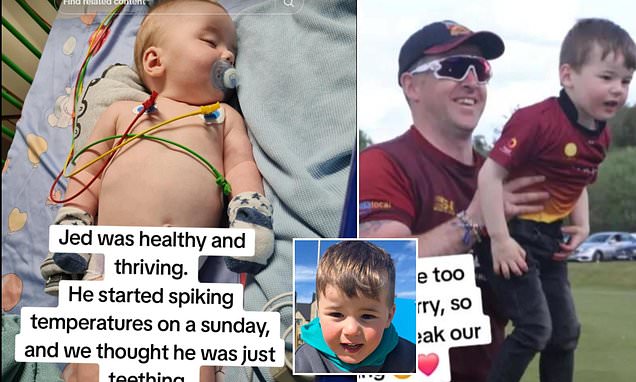A heartbroken mother has issued a stark warning to parents after her baby son was left brain damaged by the cold sore virus.
Amanda Scanlon, 39, from Derry, is speaking out to raise awareness after her son Jed contracted the virus at just six months old—causing severe brain swelling.
Now three, Jed has epilepsy and suffers from developmental delays due to damage caused by the herpes virus—which triggers cold sores.
Before falling ill, Jed had been hitting all his milestones, even giving high-fives, Ms Scanlon told the Irish Mirror.
Today, while he can walk and feed himself finger foods, he remains non-verbal and endures seizures every night.
‘We are absolutely devastated,’ Ms Scanlon said. ‘I knew cold sores were dangerous, but I didn’t realise they could leave a child with brain damage.’
She said neither she nor her husband have ever suffered from cold sores, but added:
‘We don’t dwell on where he picked it up from—it won’t achieve much. Babies could also get the virus from someone sneezing or coughing around them. You have to be really careful.’
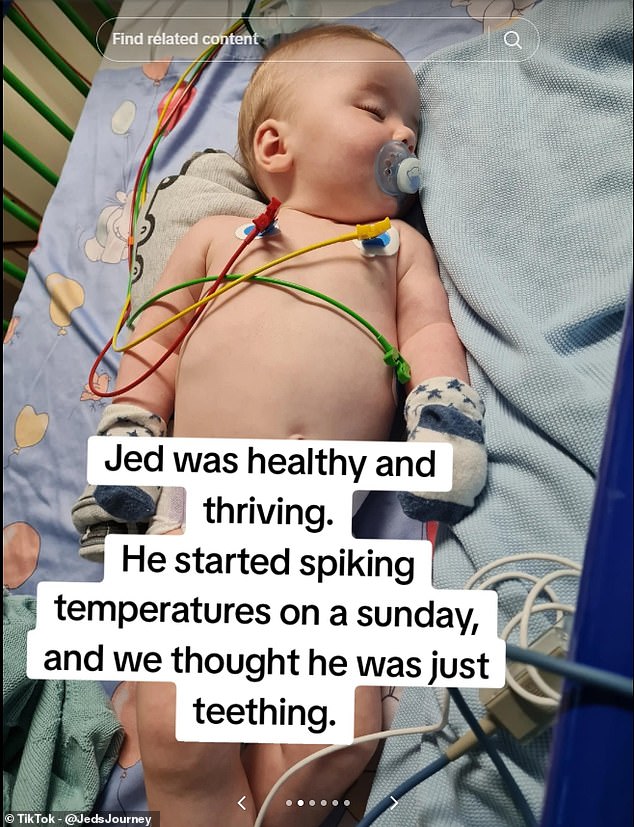
Little Jed Scanlon was just six months old when he was left brain damaged from the herpes virus
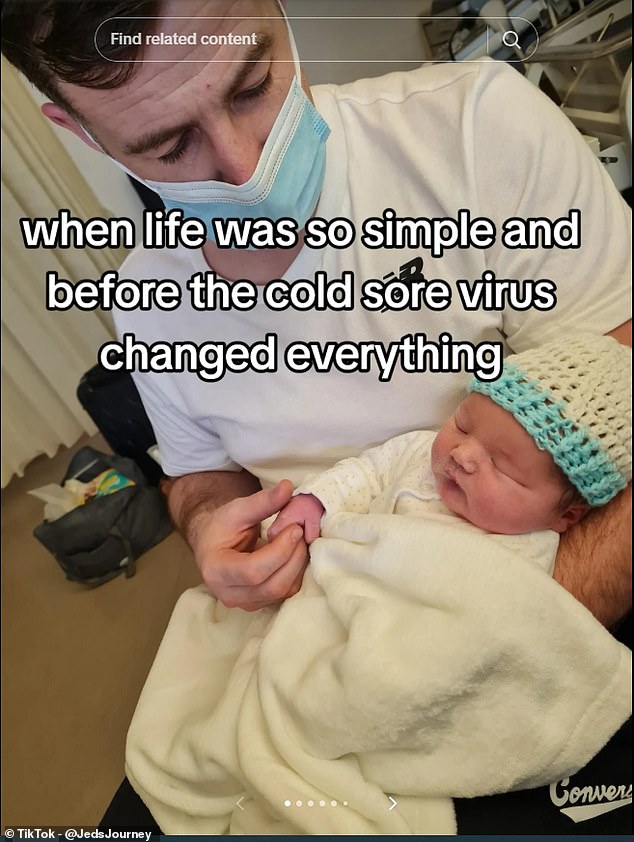
Amanda Scanlon and her husband David now face a lifetime of caring for their disabled son
Jed’s injuries are so severe that Ms Scanlon has now dedicated her life to raising awareness about the dangers of cold sores in babies.
Through her TikTok account, @JedsJourney, she shares updates on her son’s health and her experience parenting a child with complex needs.
The account has already gained more than 2,000 followers.
In one post, Ms Scanlon wrote: ‘Jed was born so healthy and content, and for the first six months he was absolutely thriving—until he became unwell.
He was diagnosed with viral encephalitis, a potentially fatal swelling of the brain, after the cold sore virus entered his spinal fluid and reached his brain.’
One of her most popular posts is a timeline of events leading up to Jed’s diagnosis—highlighting the early warning signs she now hopes other parents will learn from.
In a series of photos, Ms Scanlon recalled how Jed developed a high temperature one Sunday evening, which she initially thought was just teething.
By Tuesday, he was still unwell despite being given Calpol.
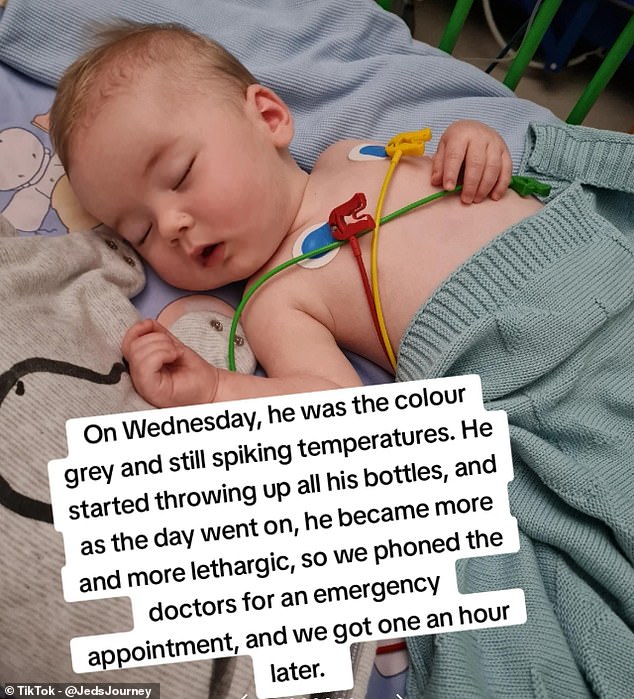
Amanda shared a timeline of how her only child was diagnosed with herpes simplex virus
A visit to the GP resulted in a prescription for antibiotics to treat an ear and throat infection.
By Wednesday, Ms Scanlon noticed Jed had grey skin, was spiking high temperatures, and kept vomiting.
An emergency GP appointment led to him being rushed to hospital.
‘When we arrived they started taking bloods, heel pricks, put a catheter in and gave him strong IV antibiotics,’ Ms Scanlon recalled. ‘He lay there lifeless.
‘Initial tests for sepsis and bacterial meningitis came back clear. But by Thursday, Jed had suffered three major seizures.’
He was given a lumbar puncture, also known as a spinal tap, a medical procedure where a needle is inserted into the lower back to collect a sample of spinal fluid for testing.
‘Forty-eight hours later we got the results, which showed viral encephalitis—and our beautiful baby boy was never the same,’ Ms Scanlon said.
The cause was the cold sore virus, officially known as herpes simplex virus (HSV-1)—which studies suggest is carried by between 50 and 80 per cent of the population.
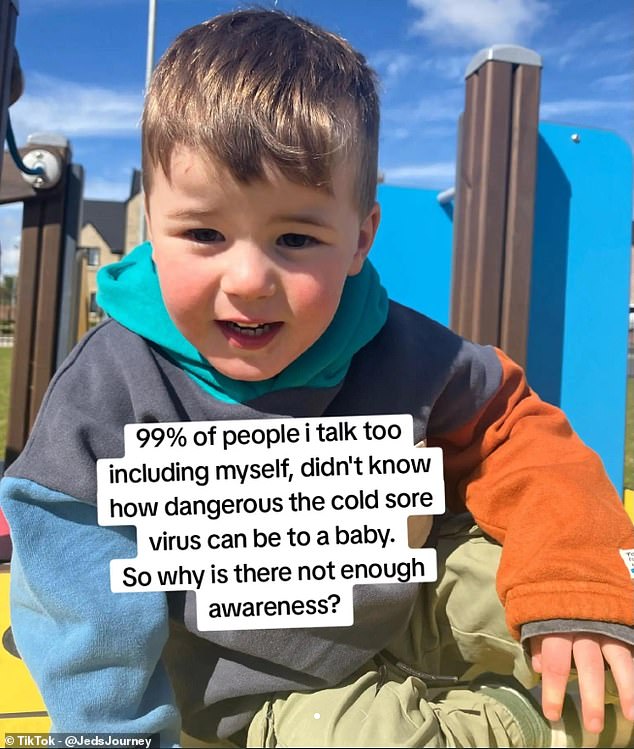
Jed is now three years old, and able to eat finger foods unaided
Most people are infected during childhood, and the virus then lies dormant in the body.
It can reactivate later in life—typically during times of stress or illness—forming the familiar blister around the lips.
While harmless for most adults, in newborns and babies the virus can be deadly, especially if it spreads to the brain.
Amanda is now calling for greater awareness of how dangerous cold sores can be for infants—even through a kiss, a sneeze or a cough.
However during this time patients are highly infectious.
The herpes virus can be incredibly dangerous infants as their immune system is yet to fully develop.
Parents are advised that the first four weeks of a baby’s life are when they are most vulnerable to a serious herpes infection.
Adults with cold sores should not kiss their baby and should also follow good hand hygiene while caring for the baby to reduce the chance of passing on the virus.
The NHS warns that if a baby does contract herpes from a parent or other adult, it may not manifest as rash and instead the child may show signs such as being lethargic or irritable, not feeding, a high temperature.
Parents are urged to act quickly if they notice this—as young children can deteriorate quickly.
Parents should contact NHS 111 or their GP for advice.
If the baby is floppy and unresponsive, difficult to wake up, has breathing difficulties, starts grunting or their tongue or skin turn blue they should call 999 immediately.


